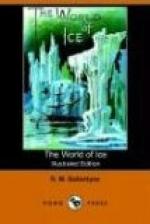When the storm ceased the ice out in the strait was all in motion, and that round the ship had loosened so much that it seemed as if the Dolphin might soon get out into open water, and once more float upon its natural element. Every preparation, therefore, was made. The stores were re-shipped from Store Island; the sails were shaken out, and those of them that had been taken down were bent on to the yards; tackle was overhauled; and, in short, everything was done that was possible under the circumstances. But a week passed away ere they succeeded in finally warping out of the bay into the open sea beyond.
It was a lovely morning when this happy event was accomplished. Before the tide was quite full, and while they were waiting until the command to heave on the warps should be given, Captain Guy assembled the crew for morning prayers in the cabin. Having concluded, he said:—
“My lads, through the great mercy of God we have been all, except one, spared through the trials and anxieties of a long and dreary winter, and are now, I trust, about to make our escape from the ice that has held us fast so long. It becomes me at such a time to tell you that, if I am spared to return home, I shall be able to report that every man in this ship has done his duty. You have never flinched in the hour of danger, and never grumbled in the hour of trial. Only one man—our late brave and warm-hearted comrade, Joseph West—has fallen in the struggle. For the mercies that have never failed us, and for our success in rescuing my gallant friend, Captain Ellice, we ought to feel the deepest gratitude to the Almighty. We have need, however, to pray for a blessing on the labours that are yet before us, for you are well aware that we shall probably have many a struggle with the ice before we are once more afloat on blue water. And now, lads, away with you on deck, and man the capstan, for the tide is about full.”
The capstan was manned, and the hawsers were hove taut. Inch by inch the tide rose, and the Dolphin floated. Then a lusty cheer was given, and Amos Parr struck up one of those hearty songs intermingled with “Ho!” and “Yo heave ho!” that seem to be the life and marrow of all nautical exertion. At last the good ship forged ahead, and, boring through the loose ice, passed slowly out of the Bay of Mercy.
“Do you know I feel quite sad at quitting this dreary spot?” said Fred to his father, as they stood gazing backward over the taffrail. “I could not have believed that I should have become so much attached to it.”
“We become attached to any spot, Fred, in which incidents have occurred to call forth frequently our deeper feelings. These rocks and stones are intimately associated with many events that have caused you joy and sorrow, hope and fear, pain and happiness. Men cherish the memory of such feelings, and love the spots of earth with which they are associated.”




